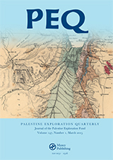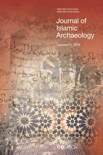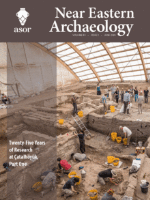
Annales Instituti Archaeologici
Scope & Guideline
Connecting Scholars, Discovering New Horizons in Archaeology
Introduction
Aims and Scopes
- Archaeological Excavations and Surveys:
The journal emphasizes detailed reports on archaeological excavations and surveys, providing insights into the methodologies and findings from various sites, contributing to a comprehensive understanding of historical landscapes. - Material Culture Analysis:
Research on artifacts, including pottery, tools, and other material remains, is a core focus. The journal publishes studies that analyze the significance of these items in understanding past societies. - Interdisciplinary Approaches:
It promotes interdisciplinary research that combines archaeology with other fields, such as anthropology, history, and environmental science, enhancing the context and implications of archaeological findings. - Cultural Heritage and Preservation:
The journal addresses issues related to the preservation of archaeological sites and artifacts, discussing strategies for protecting cultural heritage in light of modern challenges. - Regional Studies:
Special attention is given to regional archaeological studies, particularly those focusing on the Adriatic and surrounding areas, exploring local histories and connections to broader Mediterranean narratives.
Trending and Emerging
- Geophysical Survey Techniques:
Recent publications highlight a growing interest in non-invasive geophysical survey methods as tools for archaeological investigation, showcasing advancements in technology that enhance site analysis. - Organic Residue Analysis:
The application of organic residue analysis in pottery studies has emerged as a significant theme, providing new insights into ancient diets and cooking practices, which are vital for understanding past human behavior. - Community Engagement and Public Archaeology:
There is an increasing emphasis on community involvement in archaeological projects, reflecting a trend towards public archaeology that aims to engage local populations and enhance the relevance of archaeological work. - Sustainability in Archaeological Practices:
Emerging discussions around sustainability and the ecological impacts of archaeological research indicate a trend towards responsible practices that consider the long-term implications of fieldwork. - Technological Innovations in Archaeology:
The integration of new technologies, such as 3D modeling and digital archaeology, is becoming more prevalent, suggesting a trend towards innovative methodologies that enhance research capabilities.
Declining or Waning
- Medieval Archaeology:
While medieval archaeology was once a prominent theme, recent publications indicate a shift towards earlier periods, particularly prehistoric and Roman eras, suggesting a waning interest in medieval studies. - Broad Theoretical Frameworks:
Papers that engage with broad theoretical frameworks or general archaeological theory have become less frequent, indicating a preference for more site-specific studies and empirical research. - Urban Archaeology:
Research focusing on urban archaeological sites has seen a decline, possibly due to the increasing focus on rural and peripheral sites, which may be perceived as under-researched.
Similar Journals

Britannia
Preserving the Past, Inspiring Future GenerationsBrittannia is a prestigious journal published by Cambridge University Press that serves as a cornerstone for scholars and enthusiasts in the fields of Archaeology, Classics, and History. With its ISSN of 0068-113X and E-ISSN of 1753-5352, the journal has been committed to disseminating high-quality research and innovative studies since its inception in 1970, addressing vital topics that span cultural, historical, and archaeological dimensions. As a hallmark of academic rigor, it maintains a Q1 ranking in Classics and History and a Q2 ranking in Archaeology (both Arts and Humanities, 2023), reflecting its impact and significance in these disciplines. Although not an Open Access journal, it provides invaluable content for researchers, professionals, and students alike, ensuring that vital insights into ancient civilizations and cultural heritage resonate well beyond the pages of each issue. With upcoming publications scheduled through 2024, Brittannia continues to be an essential resource for anyone invested in the legacies of the past.

Archeologicke Rozhledy
Empowering researchers to uncover the stories of our past.Archeologicke Rozhledy, published by the Academy of Sciences of the Czech Republic, Institute of Archaeology, is a pivotal open-access journal dedicated to advancing the field of archaeology. Since transitioning to open access in 2019, it has made significant strides in disseminating high-quality research, serving as a vital resource for researchers, professionals, and students alike. With an ISSN of 0323-1267, the journal has gained recognition for its contributions in the domains of arts and humanities, particularly archaeology, as evidenced by its 2023 Q2 ranking in both categories. Operating out of the historical city of Prague, the journal encompasses a broad scope of archaeological scholarship, reflecting a commitment to interdisciplinary approaches and fostering dialogue within the global archaeological community. With its notable Scopus rankings—#115/413 in Arts and Humanities and #113/354 in Social Sciences—Archeologicke Rozhledy stands as a crucial outlet for innovative research and scholarly exchange.

Palestine Exploration Quarterly
Engaging Minds in the Exploration of Palestine's LegacyPalestine Exploration Quarterly, published by Routledge Journals, Taylor & Francis Ltd, is a leading academic journal that has been at the forefront of archaeological, historical, and cultural studies concerning Palestine since its inception in 1865. With an impressive Q1 ranking in multiple categories including Archaeology, History, Religious Studies, and Visual Arts and Performing Arts, the journal is recognized for its rigorous peer-reviewed content that significantly contributes to the understanding of cultural heritage and societal dynamics in the region. The UK-based journal offers an array of scholarly articles, reviews, and reports aimed at researchers, professionals, and students in the humanities and social sciences. With a strong focus on advancing knowledge and fostering academic discourse, the Palestine Exploration Quarterly remains an invaluable resource for those engaged in the exploration and interpretation of Palestine's rich history and heritage, now accessible through various academic libraries worldwide.

Azania-Archaeological Research in Africa
Bridging the Past and Present of African Archaeology.Azania-Archaeological Research in Africa, published by Routledge Journals, Taylor & Francis Ltd, stands as a premier academic resource in the field of archaeology, specifically focusing on African archaeological research. With a remarkable tradition dating back to 1966, the journal spans over half a century of rigorous scholarship, aiming to enrich our understanding of Africa's diverse cultural and historical narratives. Currently indexed in the prestigious Q1 category for both Archaeology and Arts and Humanities, it ranks impressively in the Scopus database, placing within the top 12% of journals in its field. This commitment to excellence facilitates the dissemination of innovative and insightful research, catering to a broad audience of researchers, professionals, and students alike. While the journal is not open access, its impactful contributions continue to shape contemporary archaeological discourse, making it an essential resource for anyone passionate about the study of Africa's archaeological heritage.

Spal
Bridging Time: Where Archaeology Meets History.Spal is a distinguished academic journal dedicated to the fields of Archaeology and History, published by the University of Seville, Editorial. With an ISSN of 1133-4525 and an E-ISSN of 2255-3924, it has established a prominent reputation within the scholarly community, currently enjoying an impressive Q1 ranking in Archeology (Arts and Humanities) and History, alongside a Q2 ranking in Archeology for 2023. The journal serves as a critical platform for researchers, professionals, and students alike, promoting the dissemination of cutting-edge research and innovative methodologies in these vital disciplines. Spal's Scopus Ranks place it in the 84th percentile for Arts and Humanities - History and the 72nd for Archeology within the field, emphasizing its impact and relevance in contemporary scholarship. Although it operates under a traditional access model, its commitment to advancing knowledge and discourse in archaeological and historical studies remains unwavering. The journal's coverage spans from 2015 to 2024, positioning it well to contribute to ongoing academic conversations and foster collaborations within the global research community.

Ancient Asia-Journal of the Society of South Asian Archaeology
Bridging Cultures Through Archaeological DiscoveryAncient Asia - Journal of the Society of South Asian Archaeology, published by ARF India, stands as a pivotal resource for the exploration and dissemination of archaeological research focused on the rich history and culture of South Asia. Since its inception as an Open Access journal in 2006, it has become an essential platform for scholars and enthusiasts alike, boasting an impressive range of quartile rankings across multiple disciplines, including Anthropology, Archaeology, History, and Visual Arts. With expansion into various indexed categories and consistent dissemination of impactful research common to this highly diverse field, Ancient Asia aims to foster interdisciplinary dialogue, facilitate collaboration among researchers, and enhance the global understanding of ancient civilizations within the region. By embracing an inclusive access model, the journal encourages wide readership and engagement, positioning itself as a key player for students, professionals, and academics interested in delving into the archaeological marvels of South Asia.

Stratum Plus
Advancing Knowledge in Anthropology, Archeology, and HistoryStratum Plus, published by HIGH ANTHROPOLOGICAL SCH UNIV, is a distinguished academic journal based in Moldova that focuses on the fields of Anthropology, Archeology, and History. With an impressive impact factor reflecting its stature—ranked in the Q2 category for both Anthropology and Archeology, and Q1 for Archeology in the arts and humanities—this journal is a vital resource for scholars, professionals, and students alike. The journal's comprehensive scope encompasses a wide array of interdisciplinary studies, making it a beacon for innovative research and critical discourse within these disciplines. Since its inception in 2014, Stratum Plus has strived to foster academic excellence and knowledge dissemination, thus playing a crucial role in shaping contemporary anthropological and archaeological thought. While currently not available as Open Access, the journal maintains a strong online presence, with access options available through institutional subscriptions. Located at ZIMBRULUI 10A ST, KISHINEV MD-2024, MOLDOVA, Stratum Plus invites contributors and readers to engage with cutting-edge research that continues to enrich the global academic community.

Journal of Islamic Archaeology
Preserving Islamic Heritage, One Artifact at a TimeJournal of Islamic Archaeology is a distinguished publication dedicated to advancing the field of archaeology through the lens of Islamic heritage and culture. Published by EQUINOX PUBLISHING LTD, this journal provides a platform for researchers, professionals, and students to disseminate their findings and engage in critical dialogue regarding the archaeological aspects of Islamic societies from 2014 to the present. With an ISSN of 2051-9710 and E-ISSN 2051-9729, the journal is indexed within significant academic databases and positioned notably in the Q3 and Q2 quartiles for archaeology in the Arts and Humanities and Social Sciences categories, respectively. The journal fosters scholarly exchange and innovation, drawing attention to the rich tapestry of Islamic archaeology, and securing its role as an essential resource for practitioners and academics alike. Its commitment to rigorous peer-review and high-quality contributions ensures a valuable repository of knowledge, enhancing the understanding of an often underrepresented field in archaeology.

Vjesnik Arheoloskog Muzeja u Zagrebu
Unlocking the Secrets of the PastVjesnik Arheoloskog Muzeja u Zagrebu, published by the ARHEOLOSKI MUZEJ & ZAGREBU, is a vital platform for disseminating scholarly research in the field of archaeology. With its Open Access model established in 2007, the journal ensures that vital archaeological findings and theories are accessible to a global audience, fostering greater collaboration and knowledge-sharing among researchers, professionals, and students. The journal is based in Croatia and has been an essential part of the academic landscape since its inception, with convergence noted in years such as 1979 and 1981, and continuing consistently from 2014 to 2023. While it currently holds a Q4 ranking in both the Arts and Humanities and Archaeology categories, its contributions to the understanding of archaeological heritage in the region are invaluable. Positioned within the 30th percentile among its peers in Scopus rankings, the journal endeavors to elevate the discourse around archaeological practices and findings, making it an important resource for anyone engaged in the pursuit of archaeological knowledge.

NEAR EASTERN ARCHAEOLOGY
Bridging Past and Present Through Archaeological InquiryNEAR EASTERN ARCHAEOLOGY, published by University of Chicago Press, is a premier journal dedicated to the field of archaeology, particularly focusing on the rich cultural heritage and archaeological findings of the Near East. With an ISSN of 1094-2076 and an E-ISSN of 2325-5404, this esteemed publication provides a vital platform for scholars and practitioners to share their research, insights, and discoveries. The journal holds an impressive ranking in the Q1 quartile for both Archaeology and History in 2023, reflecting its significant impact within these fields and a robust history of scholarly contribution. The journal has been pivotal in shaping discussions around archaeological methodology, theory, and contemporary issues from 2002 to 2024, as it continues to reach a wide audience through various access options. With Scopus rankings placing it in the top percentiles for both History and Archaeology, NEAR EASTERN ARCHAEOLOGY represents an essential resource for researchers, professionals, and students alike, fostering the exploration and understanding of the region's archaeological narrative.